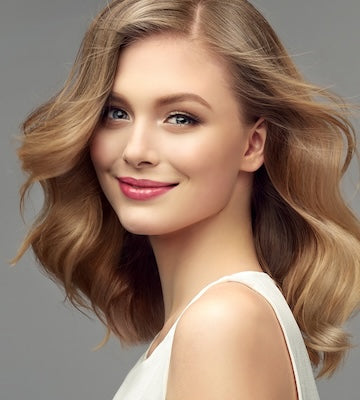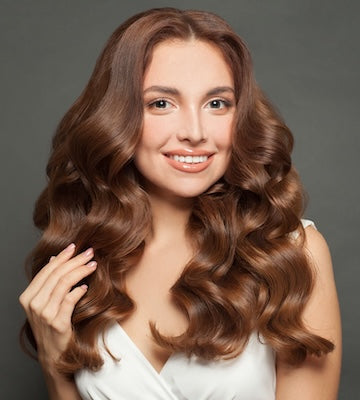Hormone Replacement Therapy (HRT) is life-changing for many women, offering huge relief from menopause symptoms. But like all medications, it can come with side effects and hair loss on HRT is a concern many women share.
If you’re navigating the ups and downs of menopause, it can feel like your body is changing in ways you never expected. One day you’re dealing with hot flushes, the next it’s night sweats, brain fog or feeling more emotional than usual. And for some, almost out of nowhere, you might notice hair thinning or falling out. It’s upsetting, and you’ll naturally ask: does HRT cause hair loss?
In this article, we’ll walk through everything you need to know about HRT and hair loss in women. We’ll explore what HRT is, how it affects your hair and most importantly, what you can do to protect and restore your hair during the menopause transition. Let’s take it one step at a time.
Can HRT cause hair loss?
The short answer? Yes, HRT hair loss can happen for some women. But it’s not always the direct cause. And in some cases, HRT can even improve hair health.
So what’s going on?
HRT works by topping up the levels of oestrogen and, in some cases, progesterone, two hormones that naturally decline during menopause. These hormones don’t just affect periods and fertility; they’re also involved in skin health, bone strength, mood regulation and - you guessed it - hair growth.
Now, here’s where it gets a bit more nuanced. Different types of HRT can affect people in different ways. For example:
-
Oestrogen-only HRT, usually prescribed for women who’ve had a hysterectomy, tends to have a more stabilising effect on hair, helping it stay in its growing phase longer
-
Combined HRT (containing oestrogen and progestogen) can, for some, lead to hair thinning or increased shedding - especially if the progestogen used has androgenic (testosterone-like) effects
- Some synthetic progestogens can trigger hormone imbalances that affect the scalp’s sensitivity and contribute to “androgenic alopecia”, or female pattern hair loss
So yes, hair loss with HRT is possible. But it depends on the formulation, your body’s sensitivity to hormones and other factors going on at the same time.
What is HRT and what is it used for?
Before we dive into the details of menopause HRT and hair loss, let’s take a quick step back and clarify what HRT actually does.
HRT, or Hormone Replacement Therapy, is used to ease symptoms of perimenopause and menopause by replacing the oestrogen (and sometimes progesterone) your body stops producing naturally.
As oestrogen levels fall, many women experience a wide range of symptoms, including:
- Hot flushes and night sweats
- Mood swings and anxiety
- Sleep disturbances
- Vaginal dryness
- Loss of libido
- Brain fog or forgetfulness
- Joint pain
- Fatigue
HRT can help restore hormonal balance, which in turn relieves these symptoms. For most, it’s transformative - improving quality of life, sleep, focus and even helping protect bones against osteoporosis. That said, it’s not a magic fix, and doesn’t come without potential downsides. Potential HRT side effects include:
- Breast tenderness
- Spotting or irregular bleeding
- Headaches or nausea
- Bloating
- Fluid retention
- Mood changes
- And in some cases, hair loss and thinning
Which brings us to the next question…
Is HRT making my hair fall out?
This is a tricky question to answer because HRT and hair thinning can coincide with other menopause changes. In fact, many women notice hair changes before they even begin HRT, simply as a result of natural hormonal shifts.
Let’s talk about what’s happening under the surface.
Your hair grows in cycles. At any given time, around 90% of the hairs on your head are in the anagen (growth) phase, while the rest are in the catagen (resting) or telogen (shedding) phases. Oestrogen helps keep hair in that growth phase for longer. So when oestrogen drops during menopause, more hairs move into the shedding phase. Which is why you might notice more hair falling out.
Other common causes of hair loss during menopause include:
-
Stress: which can push hair into the shedding phase (known as telogen effluvium)
-
Thyroid imbalances: common in midlife and can slow down hair growth
- Iron or B12 deficiency: both essential for healthy hair follicles
-
Poor sleep and fatigue: disrupting the delicate hormone balance
- Diet: not getting enough protein or essential fatty acids can lead to weaker hair
So if you’re noticing hair loss with HRT, your medication may be a contributing factor. But it might also be part of the wider picture of menopausal change.
Does HRT cause hair thinning?
As we’ve touched on, HRT and thinning hair do sometimes go hand-in-hand, especially if your HRT contains a progestogen that has androgenic (testosterone-like) properties. These androgens can encourage a process called follicle miniaturisation, which leads to shorter, finer hairs and ultimately, visible thinning.
However, this isn’t the case for everyone. In fact, some women experience the opposite and find HRT improves their hair quality.
So what are the benefits of HRT for hair?
Well, oestrogen has a protective effect on hair follicles. It helps:
- Keep hair in the growing phase longer
- Reduce scalp inflammation
- Support collagen and skin health around the follicle
- Improve overall blood flow to the scalp
This is why some women notice thicker, healthier hair when starting HRT - especially if hair loss was driven by low oestrogen in the first place.
But ultimately, the effect of HRT on your hair depends on:
- Your unique hormone profile
- Your body’s sensitivity to androgens
- The type and delivery method of HRT you’re taking (e.g. patch vs pill)
- Genetics, stress levels, hair care routine and nutrition
How to prevent hair loss on HRT
If you’ve started HRT and noticed your hair isn’t quite what it used to be (perhaps thinner around the crown, more shedding in the shower, or just generally feeling lifeless) it can be really unsettling - especially when you were hoping HRT would help you feel more like yourself again.
The good news is, whether your HRT hair loss is directly linked to your treatment or simply part of the bigger hormonal picture, there are gentle, practical things you can do to support your hair’s health and regrowth. These aren’t miracle fixes, and they won’t work overnight but they do make a real difference over time.
Here are some of the most effective ways to care for your hair while on HRT.

1. Talk to your doctor about your HRT type
Not all HRT types affect hair in the same way. So if you’ve noticed thinning or extra shedding since starting treatment, it’s worth having an open conversation with your doctor.
Some forms of combined HRT (particularly those including synthetic progestogens), have mild androgenic effects. That means they behave a little like male hormones. For some women, that can trigger sensitivity in the hair follicles and lead to thinning, particularly at the crown or around the hairline.
If you’re wondering about the best HRT for thinning hair, it’s worth asking about transdermal HRT (things like gels, sprays or patches). These are absorbed through the skin and offer a more stable hormone delivery, reducing hormonal fluctuations affecting hair growth.
2. Add targeted supplements
During menopause, your body’s nutritional needs change - and that can impact your hair. Even if you’re eating well, you might still be low in vitamins and minerals supporting hair health.
So, what supplements are good for thinning hair due to menopause?
Biotin is often recommended for thinning hair, as it plays a role in keratin production, keeping hair strong. Vitamin D is another important one - many of us (especially in the UK!) are low in it without realising, and it’s essential for healthy hair follicle cycling. Zinc and selenium support the skin and scalp, while iron and vitamin B12 are important if you’re tired or run down, as low levels can contribute to hair loss.
Before starting any new supplement, it’s a good idea to check with your GP or pharmacist, especially if you’re taking other medications.
3. Simplify your hair care routine
When your hair feels fragile, it’s tempting to throw every product on the shelf at it but a simpler, gentler routine is often most effective. Start with a sulphate-free shampoo and conditioner, ideally designed for sensitive or thinning hair. Harsher cleansing shampoos can strip your scalp of its natural oils, leaving it dry and more prone to breakage.
Cutting back on heat styling also helps - straighteners, curling wands, and even frequent blow-drying can weaken delicate strands. And don’t forget styling habits. Tight ponytails, buns, or clips that pull on your scalp cause extra stress to the roots. Give your hair space to rest and breathe, and it will thank you.
4. Stimulate your scalp
A healthy scalp sets the stage for healthy hair. One simple and soothing habit you can build into your day is a gentle scalp massage. Using the tips of your fingers (or a soft scalp brush), spend a few minutes massaging your scalp in small circular motions. It boosts blood flow to hair follicles, which helps nourish the roots and encourages regrowth.
Adding a few drops of natural oils like rosemary, olive or argan oil can make the massage even more beneficial. Plus, massage itself can be wonderfully relaxing, turn it into a moment of calm for you, not just your scalp.
5. Manage stress levels
We often don’t realise just how much stress we’re carrying, especially during menopause, when emotional ups and downs are common. But chronic stress can affect your body in all sorts of ways, including your hair. Raised cortisol levels (your body’s main stress hormone) can interrupt the hair growth cycle and lead to shedding.
Gentle movement like yoga or Pilates, even for 10 minutes a day, can calm the nervous system. Mindfulness apps, breathing exercises, or a few quiet minutes of self-care can also slow things down. The goal isn’t complete freedom from stress, but giving your body breaks from being on high alert.
Will my hair grow back if I stop taking HRT?
Finally, if you’re experiencing HRT hair loss, let’s chat about regrowth.
There’s no single answer for everyone. But if your HRT and hair loss experience is clearly linked to a specific hormone formulation, there’s a good chance your hair will grow back once your medication is switched.
However, if the root cause is low oestrogen, stress, thyroid problems or even genetic predisposition, then stopping HRT could make things worse, not better. You may find HRT was helping more than harming.
This is why it’s so important to talk to a GP or menopause specialist before making any changes to your treatment. There may be a more suitable option that supports both your menopausal symptoms and your hair health. So don’t be scared to advocate for yourself!
In summary: menopause HRT and hair loss
In short, HRT and thinning hair can go together in some cases, especially depending on the HRT you’re using. But for others, HRT can restore hair strength and thickness, especially when low oestrogen is the main culprit.
Every woman’s experience is unique, and there are many contributing factors, from stress and nutrition to thyroid health and genetics. But with the right support, careful choices and a bit of patience, there are many ways to manage hair loss with HRT and support healthy regrowth.
At Phoenix Crown, we understand how personal hair can be - especially when you’re going through life changes like the menopause. Hair loss isn’t just cosmetic. It can affect your confidence, self-image and how you feel in the world.
That’s why we offer luxurious, pure Virgin human hair extensions - natural-looking, beautifully crafted and designed to give you the volume and elegance to feel like yourself again. Whether you’re coping with HRT hair loss, or simply want a boost, we’re here to help you feel empowered, supported and radiant.










